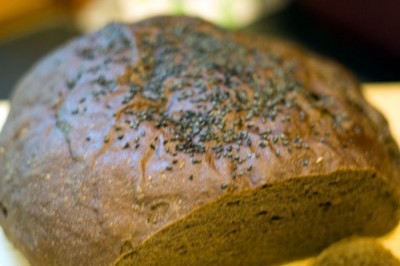This recipe was formed by the merger of a Smitten Kitchen recipe, and Pumpkin Rye Bread Angerer, submitted to the November 1990 issue of Gourmet magazine by Robert C. Angerer, of Rochester, NY.
Makes 2 loaves
The sponge:
1 cup warm water (105 to 115 degrees)
Pinch of sugar
5 teaspoons (2 packages) active dry yeast
1 cup unbleached white flour
The flavoring:
1 cup water
1/4 cup minced onion
2 teaspoons caraway seeds
1 teaspoon fennel seeds
4 tablespoons unsalted butter, sliced
1 tablespoon salt
1/4 cup molasses
1/4 cup apple cider vinegar
2 TBLS dark brown sugar
2 teaspoons instant espresso powder
1/4 cup cocoa powder
The bread:
1 cup pumpkin (or winter squash) purée
2 cups whole-wheat flour
3 cups medium rye flour
2 -3 cups unbleached, all-purpose or bread flour
a handful of cornmeal, or parchment paper
egg wash – 1 egg beaten with a bit of water
2 tablespoons Charnushka or caraway or poppy seeds
To make the sponge, measure the water into the bowl of your stand mixer (or a big bread mixing bowl) and add the sugar. Sprinkle the yeast over , mix and then let stand a few minutes till foamy. (if the yeast doesn’t foam, start over with new yeast!) Add the flour, and whisk to a smooth batter. Cover with a plate or a lid, and set aside to rise for 40 minutes to an hour depending on how warm your kitchen is, until the mixture has lots of big bubbles – like a sponge!
For the flavoring mix – Combine the minced onion and water in a small saucepan, stir in the caraway and fennel seeds, and bring to a boil over medium heat. Boil for one minute. Remove the pot from the heat and stir in the butter, salt, molasses, apple cider vinegar, and dark brown sugar. Measure the espresso power and cocoa into a smallish container (Like the spouted glass measuring cup you’ve been using for the other liquids) and stir spoonfuls of the liquid from the saucepan into them, to make a smooth paste. Scrape the paste back into the saucepan, and set aside to cool.
To make the bread dough, add the flavoring mix and the pumpkin puree to the sponge. Add the whole wheat and rye flours, and 1 cup of the white. Mix with the paddle attachment, adding enough of the remaining flour to make a firm but sticky dough. It might not clear the sides of the bowl at this point, but it should when you continue to knead, as follows. Switch to the dough hook if you like (I usually use the paddle), and knead/mix on medium speed for three minutes. The dough should clear the bowl, but it’ll still be sticky because of the rye flour.
Turn the dough out onto a floured surface and knead it into a smooth ball. Put it back in the mixing bowl (most recipes say to grease the bowl; I usually omit this step, not liking to deal with a greasy dough ball – but do what you like), cover with a damp towel, plastic wrap or a lid, and let rise until doubled – 1 1/2 to 2 hours, depending on how warm your kitchen is. Turn the dough out onto that floured surface, deflate, and divide it in half. Shape each half into a ball, and place on cornmeal-sprinkled or parchment-lined baking sheets. Brush the tops with the egg, sprinkle with the decorating seeds, and brush again to seal the seeds on. Cover with a damp towel or plastic wrap and let rise until puffy – probably not quite doubled, but bigger – 40 minutes to 1 hour. During the last 15 minutes of rising, heat the oven to 350°s. Bake for 45 – 60 minutes until well-browned – checking frequently, since oven temperatures do vary. My favorite doneness test for bread is to turn the loaf over and see if you can hold two fingers against the bottom for a few seconds – if it’s not done, it will be too hot from steam coming out of the wet middle of the loaf for you to touch it – put it back in the oven for a few more minutes.
Eat sliced thin spread with salted butter – or cut thicker and toasted with butter and jam – or topped with slices of cheese – or plain!

